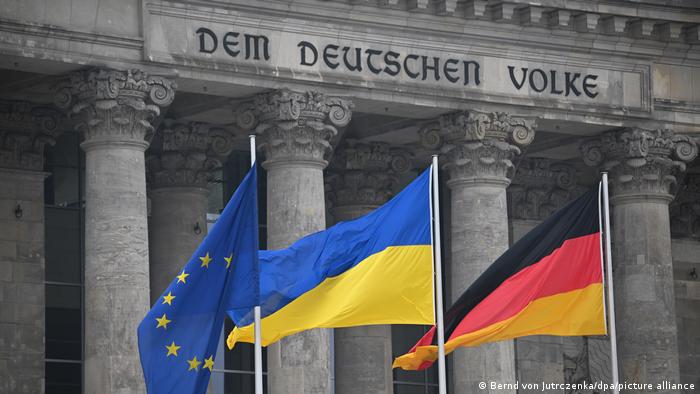[ad_1]
Most European countries are calling for an oil embargo against Russia. The Baltic states are seeking a leading role for Germany. With each passing day in Ukraine, confidence in Berlin is waning.
Several protest actions against Russia’s war in Ukraine in one day, despite each other. Lithuanian Olympic swimmer Rūta Meilutytė swam last week in front of the Russian embassy in Vilnius inside a tank where red paint was thrown. An action that went viral on social media. On the same day, dozens of demonstrators lay in front of the German embassy in Vilnius as dead. As a protest that Berlin to this day against the complete embargo on Russian oil and gas is, and because every day millions of euros go to Russia. Just a few days later, a Russian missile kills dozens in the eastern Ukrainian city of Kramatorsk.
Germany’s image is weakening
“You feed the devil,” says comedian Oleg Surayev. In Lithuania, support for Germany is falling every day. Germany has been for us an “example of morality”, says the 33-year-old. “Now it seems that the father is not that good a man.” “Many Poles think so too.” Together with Polish activists, he recently staged an action in Poznan, Poland against trade with Russia and against firms that despite the embargo continue to do business with Russia. “Many Polish truck drivers supported us, even the police,” said Surayev.
With the exception of Hungary, almost all Eastern and Central European countries demand a full embargo against Russia. The Germans are paying the salaries of the soldiers who are committing massacres in Butsha, according to Lithuanian Foreign Minister Gabrielius Landsbergis, who spoke to DW. Neighboring countries like Latvia and Estonia have taken early steps to become independent of Russian gas. Lithuania has set up a liquefied gas terminal in Kleipeda and a transport network, with which these countries can be supplied.
“Germany is not the first to stop importing gas and oil from Russia, as the German economy would suffer, it is costing the country a lot of political credibility, especially in Eastern countries,” Eastern European researcher Volker Weichsel told DW. “The perception of the Baltics is that speed matters, and that this incredible slowness of German politics, the fixation on rules and laws, can not withstand the speed of the authoritarian regime in Russia and not at all the speed of war.” German policy of continuing trade with Russia, and that trade can also drive political change has failed.
Germany ignored the signs from Russia
“In terms of energy policy, Germany is on the brink of collapse.” Many years ago, governments in Vilnius, Riga or Tallinn and Warsaw had warned of proximity to Russia. “Now we are experiencing a rapid change, which resembles a 100-meter sprint. “Everyone has to do it, but those who have long understood Russia’s aggressive stance have only 10 meters to do.” It is clear to Eastern Europeans that they will be the first to be attacked by Russia if Ukraine does not win this war. “Apart from arms supplies, the energy embargo would massively weaken Russia. Especially an oil embargo. “This is what the Baltic states demand, an immediate oil embargo,” the expert said.
Offensive weapons for Ukraine
Offensive weapons are needed, not just defensive weapons, says researcher Volker Weichsel. Germany can regain the lost trust in its Eastern European partners only if it actively supports the shipment of these weapons and takes a leading role in the EU. “The perception that Germany is acting arrogantly has been greatly strengthened.” According to the Polish position today Warsaw is convinced that he was right, says the researcher. According to him, there will be political consequences for the failure of German policy, which provided for getting on the track through dialogue, non-breaking of bridges and understanding.
Artist Oleg Surayev from Vilnius, who organized the protest in front of the German embassy, has lived in Berlin for some time and understands the reasons for the German reservation and the historical sensitivity behind the atrocities of National Socialist Germany. But it is precisely this story that should make Germany act now, he says, and support Ukraine, even if it hurts the country and the EU economically. “We are all Europeans and I feel responsible for Ukraine,” he said
top channel
[ad_2]
Source link















